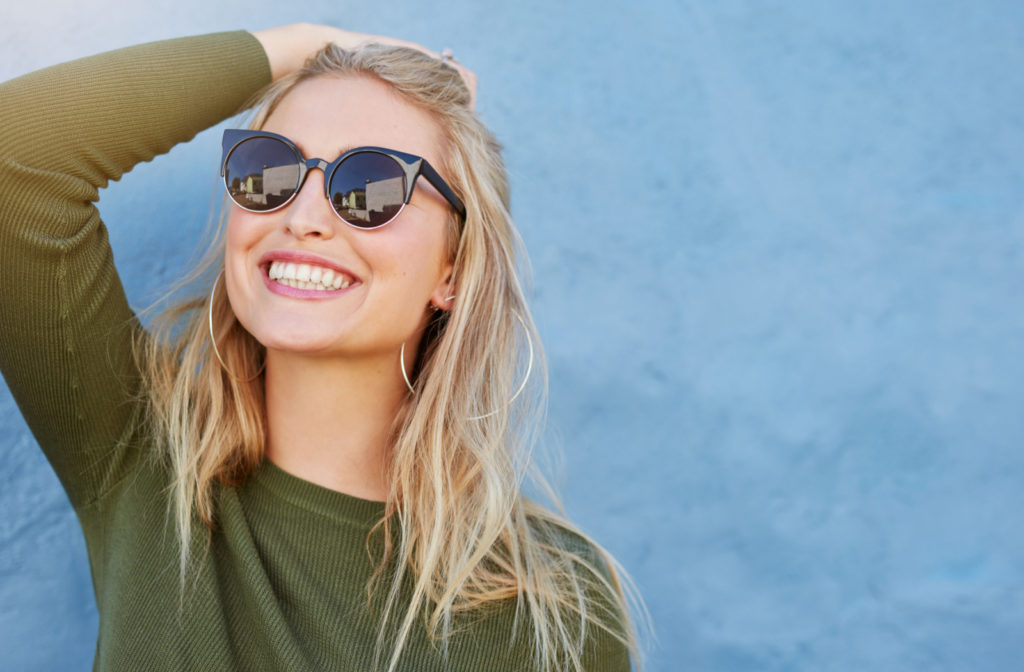We live in a world where technology surrounds us, making our lives far easier. But one of the buzzwords of modern technology is blue light. The screens on electronic devices emit blue light, a type of light of a higher frequency on the visible light spectrum. Blue light has become a significant concern when it comes to sleep hygiene and healthy screen use, and glasses are available to block blue light from reaching your eyes.
Sunglasses can block some degree of blue light, as blue light also emits from the sun, and blue light is close to ultraviolet (UV) rays on the light spectrum, but it depends on the tint of the lenses. However, sunglasses emphasize protection from UV rays over everything else, and UV protection is more important for your eye health overall.
How Is Blue Light Produced?
High-energy blue light is nearly as powerful as UV light. The light waves are short, vibrating within the 380 to 500-nanometer range, whereas UV light falls below the 400-nanometer range.
Blue light is produced by the sun, but it’s also emitted by many of our electronic devices, such as smartphones, laptops, and tablets. LED and fluorescent lighting also have high levels of blue light.
How Does Blue Light Affect Your Body?
The blue light emitted from digital screens can interfere with your circadian rhythm or your internal body clock that regulates your sleep and wake cycle. The blue light can suppress the production of melatonin, a hormone that regulates sleep, making it more difficult for us to fall asleep at night.
If you use your phone or laptop right before bedtime, prolonging exposure to blue light, you can experience poor sleep quality. Not getting adequate sleep can negatively impact your physical and mental health and leave you feeling lethargic throughout the day.
How to Reduce Your Exposure to Blue Light
One of the best ways to reduce exposure to blue light is to limit your screen time before bedtime. You can also adjust the intensity of the screen on your devices to reduce the amount of blue light emitted. There are also apps and settings on most devices to reduce blue light from our screens.
Many people opt for blue light-blocking glasses, which can reduce the amount of blue light reaching our eyes and promote more regular melatonin production.
Sunglasses & Blue Light
The right lens tints for blocking blue light are amber and brown. These lenses are specially treated with unique coatings that filter the blue light spectrum from penetrating the eyes. These lenses can offer protection against blue light and enhance contrast and depth perception.
If you want sunglasses that can block blue light, you should always look out for blue light-blocking properties explicitly. Otherwise, most sunglasses will emphasize UV protection and anti-glare.
What to Look for in Sunglasses
Sunglasses are more than just an accessory to complete your outfit. They are a daily necessity that keeps your eyes healthy. However, not all sunglasses are created equal, and selecting the right pair can be overwhelming. With so many styles, shapes, and colors available, knowing what to look for is essential.
UV Protection
The primary function of sunglasses is to protect your eyes from damaging UV rays. Look for labels that indicate 100% UVA and UVB protection. Don’t be fooled by darker lenses; this doesn’t necessarily mean better protection. It’s also important to note that UV protection is not limited to expensive brands, as even affordable options can provide adequate protection.
Lens Quality
The quality of the sunglasses lenses is essential in choosing sunglasses. Polarized lenses can reduce glare, making them an excellent choice for driving and being outdoors.
Additionally, scratch-resistant coatings can prolong the life of your sunglasses. Lastly, consider the material of the lens, as different materials offer their own benefits. For example, polycarbonate lenses are excellent for sports as they are shatter-resistant.
Frame Shape/Size
The shape and size of the frame play a significant role in both style and comfort. Opt for a frame that fits your face correctly and does not slip off. Also, consider the frame’s shape and how it complements your face shape.
Wrap-around sunglasses are ideal for blocking UV rays from different angles since they have a broader frame. They can offer maximum coverage, which helps prevent peripheral vision exposure to harmful UV rays.
Protect Your Eyes from UV Rays
Sunglasses are not just a fashion accessory but a daily necessity that should never be compromised. Whether you need a prescription pair to correct your vision or want an essential pair of sunglasses to shield your eyes, visit The Eye Care Team to shop a wide range of glasses and build your custom pair of sunglasses from frames to lens material and special coatings.



